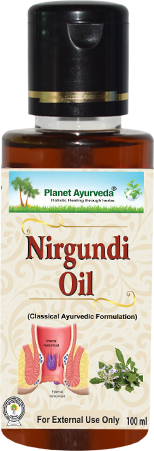Description
The number of platelets in the blood is referred to as Platelet Count and the normal range of platelet count is 1,50,000 to 4,50,000 per micro liter of blood. The platelet count less than 1,50,000 is termed as thrombocytopenia. The low platelet count has the symptoms such as bleeding from the gums, rash such as pinprick sized spots on the skin, nosebleeds, skin discolouration such as bruising and severe bleeding.
Planet Ayurveda has manufactured an herbal formulation as per the ancient texts. Bleeding disorders are classified among Raktpitta group of disorders.

Reference: Charak Samhita, Part 2, Chikitsa sthanam, Raktpitt chikitsadhyaya – 8
Meaning: Due to the intake of hot, bitter and sour food, there is a vitiation of Pitta dosha which gets mixed up with the blood tissue. Pitta is produced in the blood, but when it gets vitiated and mixes with blood, it vitiates the blood too. As a result, there is a production of heat in the blood and due to this heat, tissues such as muscles and blood get destroyed.
INDICATIONS OF PLATO PLAN SYRUP
- Helpful in increasing platelet count
- Useful in thrombocytopenia due to dengue fever
- Beneficial in ITP (Idiopathic Thrombocytopenic Purpura)
- Useful in increasing body’s immunity level
- Controls fever
- Decreases toxins in the blood
- Decreases bodyache
WHAT ARE THE INGREDIENTS OF PLATO PLAN SYRUP?
Each 10 ml syrup contains standardized extracts of:
| S. No. | Herb Used | Latin Name | Quantity |
| 1. | Erand Karkati | Carica papaya | 200mg |
| 2 | Giloy | Tinospora cordifolia | 100mg |
| 3. | Wheat grass | Triticum aestivum | 50mg |
| 4. | Ashwagandha | Withania somnifera | 200mg |
| 5. | Amalaki | Emblica officinalis | 100mg |
| 6. | Shigru | Moringa pterygosperma | 100mg |
| 7. | Jeevanti | Leptadenia reticulata | 100mg |
| 8. | Draksha | Vitis vinifera | 50mg |
| 9. | Sugar Syrup | q.s. |
WHAT ARE THE USES OF INGREDIENTS USED IN PLANET AYURVEDA’S PLATO PLAN SYRUP?
1. Erand Karkati (Carica papaya)
This plant is useful in increasing platelet count. It is quite effective even when there is a sharp decline in platelet count and also prevents the complications of thrombocytopenia.
2. Giloy (Tinospora cordifolia)
Giloy is a famous Ayurvedic herb which is a well-known immuno-modulator, therefore used for the correction of auto-immunity. It is widely known for Raktpitta (bleeding disorders) as it is best known to cause an astringent effect.
3. Wheat Grass (Triticum aestivum)
This herb contains many basic components and trace elements such as Vitamins A, B, C, E, proteins and amino acids, enzymes, minerals such as calcium, iron, sodium, potassium, magnesium, zinc, chlorophyll, antioxidants etc. It contains 70% chlorophyll, which is almost chemically identical to hemoglobin thus this vital component helps in building hemoglobin.
4. Ashwagandha (Withania somnifera)
Ashwagandha is a commonly used herb in Ayurveda for increasing red blood cells, white blood cells and platelet count as this herb has immuno-modulating properties.
5. Amalaki (Emblica officinalis)
Amla is an excellent source of Vitamin C, therefore it helps in boosting immunity.

Reference: Bhavprakash
Meaning: In this shloka, uses of amla are described. According to this shloka, amla is quite similar to Haritaki in qualities. It is useful in bleeding disorders, diabetes and urinary tract disorders.
6. Shigru (Moringa pterogosperma)
This herb is packed with beneficial nutrients such as alkaloids, proteins, ascorbic acid, beta sitosterol etc. which support immune health.
7. Jeevanti (Leptadenia reticulata)
This herb has cold potency and its use is indicated in Raktapitta disorders such as ITP, heavy menstruation, nasal bleeding etc.
8. Draksha (Vitis vinifera)
Draksha is cooling in nature and rich in nutritional properties. Draksha has various medicinal properties that are explained in Sholka given below:

Reference: Charak Samhita Sutrasthana / Chapter No. 27 / Shlok No. 125 & 126
Meaning: In this sholka, benefits of Draksha or raisins are described. It provides immediate relief in excessive thirst, burning sensation, fever, asthma, respiratory disorders which involve difficulty in breathing, bleeding disorders, chest injury, tuberculosis, chronic respiratory disorders, wasting of muscles, Vata Pitta disorders, hoarse voice, alcoholism, bitter taste in tongue, mouth dryness, cold and cough. Raisins improve nourishment, and are aphrodisiac, sweet, unctuous, oily and cooling in nature.
PHARMACOLOGICAL ACTION
The ingredients used in the manufacture of Plato Plan Syrup are the rich sources of complex biochemical constituents such as glycosides, flavonoids, alkaloids, and glucosinolates help in boosting the number of platelets by stimulating the bone marrow. These ingredients increase the megakaryocytic production, thus boost platelet count.
Most of the ingredients of Planet Ayurveda’s Plato Plan Syrup show immunomodulatory activity. Ingredients such as Giloy (Tinospora cordifolia) exhibit increase in the production of bone marrow and white blood cells significantly, thus indicating the stimulatory effect on the entire hemopoietic system.
PACK SIZE
200 ml
DOSAGE
1-2 teaspoon twice daily or as prescribed by an Ayurvedic practitioner.






